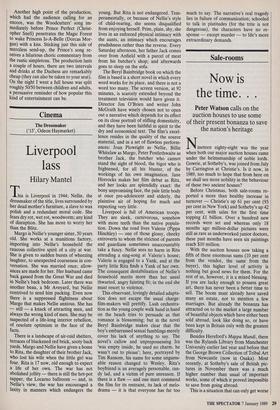Cinema
The Dressmaker ('15', Odeon Haymarket)
Liverpool lass
Hilary Mantel
This is Liverpool in 1944; Nellie, the dressmaker of the title, lives surrounded by her dead mother's furniture, a slave to wax polish and a redundant moral code. She fears dry rot, wet rot, woodworm; any kind of disruption. She has more to worry her than the Blitz.
Margo is Nellie's younger sister, 50 years old. She works at a munitions factory, importing into Nellie's household the raucous collective spirit of a city at war. She is given to sudden bursts of wheezing laughter, to unexpected coarseness in con- versation. She was married once; allow- ances are made for her. Her husband came back gassed from the Great War and died in Nellie's back bedroom. Later there was another beau, a Mr Aveyard, but Nellie contrived to send him packing. Even now there is a suppressed flightiness about Margo that makes Nellie anxious. She has — still — a knack of attracting men, and always the wrong kind of men. She may be suspected of a life-long interior rebellion, of resolute optimism in the face of the facts.
There is a landscape of air-raid shelters, terraces of blackened red brick, sooty back yards. Margo and Nellie have given a home to Rita, the daughter of their brother Jack, who lost his wife when the little girl was four. Rita is 17 now, old enough to expect a life of her own. The war has not abolished jollity — there is still the hot-pot supper, the Locarno ballroom — and, in Nellie's view, the war has encouraged a laxity in manners which endangers the young. But Rita is not endangered. Tem- peramentally, or because of Nellie's style of child-rearing, she seems disqualified from enjoying herself. Prim, plain, shy, she lives in an enforced physical intimacy with the aunts, an intimacy which encourages prudishness rather than the reverse. Every Saturday afternoon, her father Jack comes over from Anfield with a parcel of meat from his butcher's shop; and afterwards goes to sleep on the sofa.
The Beryl Bainbridge book on which the film is based is a short novel in which every word works for its place, and there is not a word too many. The screen version, at 92 minutes, is scarcely extended beyond the treatment television would have given it. Director Jim O'Brien and writer John McGrath have wisely chosen not to open out a narrative which depends for its effect on its close portrait of stifling domesticity, and they have been faithful in spirit to the dry and economical text. The film's excel- lence resides in the quality of the source material, and in a set of flawless perform- ances: Joan Plowright as Nellie, Billie Whitelaw as Margo, Peter Postlethwaite as brother Jack, the butcher who cannot stand the sight of blood, the bigot who is frightened, for all his bluster, of the workings of his own imagination. Jane Horrocks makes her film debut as Rita, and her looks are splendidly exact: the bony unpromising face, the pale little body at once pre-adolescent and elderly, the plaintive air of hoping for much and expecting very little.
Liverpool is full of American troops. They are sleek, carnivorous, somehow with more teeth than the native popula- tion. Down the road lives Valerie (Pippa Hinchley) — one of those glossy, cheeky extroverts to whom the strictest of parents and guardians sometimes unaccountably take a fancy. Nellie sees no harm in Rita attending a sing-song at Valerie's house; Valerie is engaged to a Yank, and at the party little Rita finds a Yank of her own. The consequent destabilisation of Nellie's household merits more than her usual thwarted, angry fainting fit; in the end she must resort to violence.
This observant, lovingly detailed adapta- tion does not escape the usual charge: film-makers will prettify. Lush orchestra- tion as the young couple walk hand in hand on the beach tries to persuade us that romance is blossoming; but in the novel Beryl Bainbridge makes clear that the boy's embarrassed sexual fumblings merely cover his lack of anything to say. The novel's callow and unprepossessing Ira `was empty inside, he used no charm, he wasn't out to please'; here, portrayed by Tim Ransom, his name for some unguess- able reason changed to Wesley, Rita's boyfriend is an averagely personable, ran- dy lad, and a victim of pure unreason. If there is a flaw — and one must commend the film for its restraint, its lack of melo- drama — it is that everyone has far too much to say. The narrative's real tragedy lies in failure of communication; schooled to talk in platitudes (for the trite is not dangerous), the characters have no re- sponse — except murder — to life's more extraordinary demands.










































 Previous page
Previous page